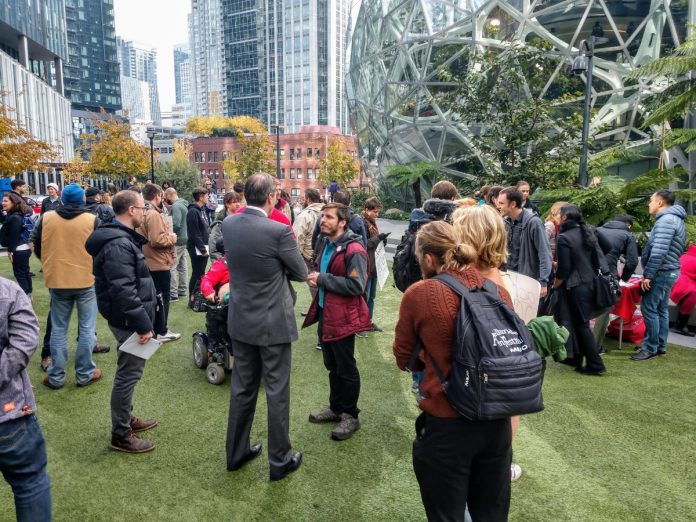
With only about 400 ballots left to tally across King County, election results have solidified, and six of seven candidates we endorsed along with a number of progressive groups prevailed–rather decisively. The one exception was Shaun Scott who lost a close race to Alex Pedersen, coming up 4.27 points short.
Not many people were predicting it would be as close as it was. Expectations were low for Scott. Despite Kshama Sawant repeatedly proving that a socialist can win a Seattle City Council race, many people–including many progressive operatives and groups–wrote Scott off. District 4 was different, we were led to believe. And the Seattle Democratic Socialists of America (Seattle DSA) couldn’t repeat Sawant’s Socialist Alternative magic.
Even the argument that the tide had turned citywide against pro-business moderate candidates given poor showings in the Primary didn’t get much traction. Pedersen did carry a 17-point lead from Primary results into the General election, but every other Seattle Times-endorsed Seattle City Council candidate started behind–and they failed to close that gap. It was the progressive candidates rather than the more conservative options that gained big.
Results as of November 13
- D1: Lisa Herbold (incumbent) 55.7% over Phil Tavel 43.9% (+9-point swing in margin from Election night)
- D2: Tammy Morales 60.4% over Mark Solomon 39.1% (+8-point swing from Election night)
- D3: Kshama Sawant (incumbent) 51.8% over Egan Orion 47.8% (+12-point swing from Election night)
- D4 Alex Pedersen 52.2% over Shaun Scott 47.6% (11-point swing from Election night)
- D5: Debora Juarez (incumbent) 60.6% over Ann Davison Sattler 39% (+6-swing from Election night)
- D6: Dan Strauss 55.6% over Heidi Wills 43.9% (+7-point swing from Election night)
- D7: Andrew Lewis 52.9% over Jim Pugel 46.6% (+7-point swing from Election night)
Socialism Is on the Rise, but Mainstream Media and Progressives Are Slow to Adjust
Expectations can be self-fulfilling prophecies. Mainstream media sources rarely suggested that Shaun Scott could win, whereas Egan Orion was constantly portrayed as ascendant–maybe even inevitable. Likewise, portrayals of Sawant as unresponsive, combative, and aloof were widely broadcast, but Alex Pedersen skipping dozens of forums and questionnaires–not to mention deleting his blog–was given passing mention if at all. It’s hard to win as a socialist, but Scott coming close should make it easier for the next socialist not named Sawant to win.
“Sawant’s combative style has angered some onetime allies, possibly tainting socialism here,” Seattle Times reporter Daniel Beekman wrote in July. “She regularly calls her colleagues corporate stooges. Several unions that previously endorsed the incumbent are opposing her this year, and Scott has secured no labor assistance at all.”
Media didn’t set expectations alone. Part of why folks assumed that Scott couldn’t win was because mainstream progressive groups and labor organizations largely sat out his race, particularly before the Amazon money bomb coaxed them into the race a few weeks to Election day. The late rally nearly worked, but imagine if progressives had united around Scott, recognizing shared cause as soon as he won the Primary. Instead we got prolonged progressive infighting.

Here’s what one prominent labor leader told Beekman in July: “People are just over the Kshama thing,” said Dustin Lambro, political director for Teamsters Local 117, which represents warehouse workers and truck drivers. “She acts like she knows better than our workers.”
Progressive political action committes (PACs) could not keep up with pro-business PACs but they did spend heavily–just not in Scott’s race, as Seattle Bike Blog highlighted. “[L]abor-backed PACs like the Civic Alliance for a Progressive Economy (“CAPE”) spent $136K supporting Lisa Herbold, who received over 50% of the primary vote and is currently winning in an 11-point landslide,” Tom Fucoloro wrote. “These PACs spent less than $2K supporting Scott. This Twitter thread from @RiallJohnson should be a wake-up call.”
Organized labor wanting to run their own candidates in Zachary DeWolf in D3 and Emily Myers in D4 is understandable and their prerogative, but it’s unfortunate that when that didn’t work they didn’t quickly pivot to support the more progressive candidate in the General election. Neither Sawant nor Scott had the backing of the Martin Luther King County Labor Council, but they still outperformed their opponents who did. Left-wing grassroots organizing can be a real force and Seattle DSA proved that by nearly toppling Pedersen with little institutional support. The growing number of tenants in this city paired with an ongoing affordability crisis will only increase this effect, offering a wedge issue for progressives to clean up.
Meanwhile, some self-described progressives talked themselves into backing Alex Pedersen. Several prominent Democratic legislators backed Alex Pedersen. Pedersen’s endorsements included House Speaker Frank Chopp (D-43), Sen. Reuven Carlyle (D-36), Sen. Jamie Pedersen (D-43), Rep. Gerry Pollet, Rep. Javier Valdez (D-46), Sen. David Frockt (D-46), Seattle Port Commissioner Peter Steinbrueck, Seattle School Board Director Eden Mack, former King County Executive Ron Sims, and former Seattle Councilmembers Tim Burgess and Nick Licata. I’d wager progressive aspiring politicians are taking a long look at that list.
With D4 Snub, No Black Councilmembers for First Time in 53 Years
In addition to socialism, race was also not covered in a deep way in most D4 election coverage. The narrative was largely that Alex Pedersen was well-prepared and well-connected to the district and Shaun Scott was a young, starry-eyed upstart. Scott being a young Black man likely made that message hit home harder for many D4 voters. This isn’t to call them racist, but implicit racial bias is a real thing proven out in scientific research. If you haven’t done the work to unpack your biases, they will sway you.

The bottom line is that with the retirement of Councilmember Bruce Harrell, Seattle won’t have a Black city councilmember for the first time in 53 years, and the D4 race did get racialized and ugly.
Ironically, we learned yesterday that support for taxing big business–a central plank of Scott’s platform absent from Pedersen’s–was highest among D4 voters–84%–according to a SEIU 775 and UFCW 21 commissioned poll. Ideologically, it seems D4 voters lined up with Scott more than his corporate-friendly and fiscally conservative opponent. Perhaps they couldn’t see beyond his race and the socialist label he embraced. Overall, 75% of poll respondents supported the council passing a law that “raises local taxes on big businesses and the wealthy to help pay for vital services.”
Since Scott ran an issues-heavy campaign, this loss really stings and makes the opportunity lost seem larger. Public housing, inclusive zoning, the Seattle Green New Deal, municipal broadband, and a robust network of bus lanes and protected bike lanes were all policies he elevated. He didn’t just run on symbolic representation for communities of color and the most disadvantaged, but offered tangible improvements to their lives and a credible promise to fight tooth and nail for them.
Instead we get a candidate that had to look up what intersectionality was on the campaign trail and mostly skipped forums where he’d be asked tough questions. Pedersen was also repeatedly documented telling constituents who asked him to support safe walking, rolling, and biking facilities, such as NE 35th Avenue bike lanes, that ‘I’m not your candidate’ and then he’d walk away. It was more important to Pedersen to stir up and benefit from backlash than reach out to people concerned about traffic violence and seriously weigh their voices. Maybe he’ll legislate differently than he campaigned, but I’m not holding my breath.
After Taking $1.5 Million from Amazon, Chamber PAC: Oops It Backfired
In a salty concession video, Orion blamed the Amazon money bomb for costing him the election. “Our arguments were completely subsumed by national media attention,” he said. $600,000 in PAC money spent on his behalf was the Goldilocks amount, while the extra million Amazon gave CASE at the end was overkill and singlehandedly cost him at least 2,000 votes, Orion seems to say. But corporate beggars can’t be choosers.
It seems pretty obvious that Amazon and the Seattle Metropolitan Chamber of Commerce took a drubbing this election, but they’re busy trying to spin the results as positive for them. Amazon issued a terse statement saying they were pleased with the results–somehow. Meanwhile, Markham McIntyre, director of the Chamber’s Civic Alliance for a Sound Economy (CASE) PAC said anti-Amazon sentiment drowned out otherwise winning messages about getting tough on crime, sweeping homeless people, and implementing budget austerity–a sort of neoliberal holy trinity. Moreover, McIntyre seemed to complain in a Seattle Times interview that Sawant campaigned too hard and was too on message.
“She has really robust campaign infrastructure and she’s in campaign mode all day, every day,” McIntyre said, promising that business leaders will try to work with the new council. “Her answer to everything is, ‘Tax business and let the government do it,’ and apparently that resonated with a lot of voters.”

It turns out $4 million couldn’t change voters’ minds in favor of neoliberalism and austerity. Election results and poll results are telling us definitively that Seattle voters want to tax Big Business and invest in critical social services, and it’s slowly setting in for the business community–not that they’ll take it to heart.
This post was updated after the November 15th ballot drop narrowed the D4 margin from 4.5% to 4.27% and reduced the estimated remaining King County ballots from 1600 to 400.
Doug Trumm is publisher of The Urbanist. An Urbanist writer since 2015, he dreams of pedestrian streets, bus lanes, and a mass-timber building spree to end our housing crisis. He graduated from the Evans School of Public Policy and Governance at the University of Washington in 2019. He lives in Seattle's Fremont neighborhood and loves to explore the city by foot and by bike.

